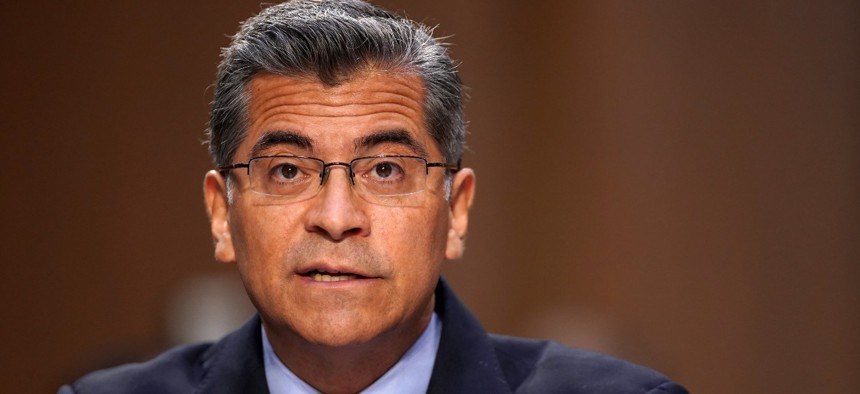
Secretary of Health and Human Services Xavier Becerra said: "Supporting the growth of Native-owned and controlled businesses serving their communities is critical to supporting families facing the economic impact of the COVID-19 pandemic." Greg Nash- Pool/Getty Images
Agency Strengthens Support for American Indians and Alaska Natives in Federal Contracting
The Indian Health Service announced a final rule to further the Buy Indian Act.
The federal agency that provides health services to American Indians and Alaska Natives took a major step on Thursday to support contracting with Native-owned and operated businesses.
A final rule for the Indian Health Service, a division of the Health and Human Services Department, was published in the Federal Register Thursday to further implement the Buy Indian Act, which was first enacted in 1910 to give preference to Native owned and controlled businesses in certain federal contracts. The Interior Department is the only other federal department to which the Buy Indian Act applies.
The issuance of the final rule “means strengthening the requirements to set aside contracts for Native-owned and controlled business,” said Santiago Almaraz, an enrolled member of the San Carlos Apache Tribe and director of the Office of Management Services for the Indian Health Service, during a media briefing on Thursday. “This is part of our commitment to improve economic conditions, provide more opportunities for Native-owned businesses, and advance the Indian Health Service mission to support economic sustainability and development in Indian country.”
A fact sheet from the Indian Health Service specifies this final rule replaces an existing one. The Government Accountability Office found the Buy Indian Act, then 105 years old, was still “a work in progress” as well as identified shortcomings in Interior and HHS’s use of it over the years. HHS still has two open recommendations––one on better clarifying policies about the act and another on data collection. The department agreed with both and demonstrated how it would make progress toward closing them through the then-proposed rule.
“The final rule alleviates unnecessary regulatory burden on Indian economic enterprises, expands application of the Buy Indian Act to all construction [projects], better adheres to the language of the Buy Indian Act, strengthens oversight of the Buy Indian Act to reduce the potential for fraud and abuse, and clarifies the preference for Indian economic enterprises,” said Almaraz. “We will also support and implement new strategies to improve compliance, training and reporting on the Buy Indian Act.”
The investments as a result of the final rule will go toward “the planning, design and construction of health care facilities, personnel quarters, and water supply and waste disposal facilities,” he added. Almaraz thanked tribal leaders for their feedback over the last year in crafting the rule.
Over the last few years the Indian Health Service has obligated over a billion dollars annually for commercial contracts (which has included pandemic related funding for medical goods and services) and it recently received $3.5 billion for construction of sanitation facilities from the infrastructure package, so there will be plenty of funding opportunities for Native owned and controlled businesses, Almaraz said.
Government Executive asked the Indian Health Service in a follow-up question approximately how much the agency already spends annually on Native-owned and operated business.
“In fiscal year 2021, [the Indian Health Service] set-aside $55.9 million or 4.3% of total eligible dollars under the Buy Indian Act,” which includes the formal set-asides, Almaraz said. “With this rule, however, [the Indian Health Service] will increase the amount that it sets aside for Buy Indian Act contracts. All dollars that went to Native-owned businesses (not funds set aside under the Buy Indian Act) in [fiscal] 2021 [added up to] approximately $200 million.”
The final rule also supports the 2020 Indian Community Economic Enhancement Act, which required the Indian Health Service and [the Interior Department's] Bureau of Indian Affairs “to harmonize Buy Indian Act procurement procedures,” HHS noted in a press release.
“Supporting the growth of Native-owned and controlled businesses serving their communities is critical to supporting families facing the economic impact of the COVID-19 pandemic,” said Health and Human Services Secretary Xavier Becerra, in a statement. This rule–– which has been in the works since late 2020 and will take effect on March 22––supports the president's “Build Back Better framework to deliver meaningful outcomes for American Indians and Alaska Natives,” he said.
“It’s great that another agency is expanding contracting opportunities for Indian-owned federal contractors,” Kevin Wickliffe, counsel at Koprince McCall Pottroff LLC, who focuses on federal contacts and regulatory compliance, told Government Executive.
“You might think of an ‘act’ as being a self-contained set of statutes,” he continued. But because of the authorities HHS and Interior have from the Buy Indian Act, “you will find application of [it] in procedures throughout the government procurement regulations.”
Update: This article has been updated to better reflect the applicability of the Buy Indian Act.
NEXT STORY: Postal Board Elects DeJoy Ally as New Chairman







